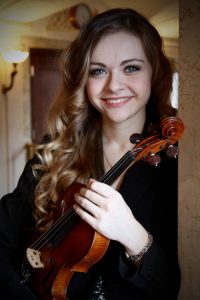Q&A with Holly Workman, violin
 This past summer the Bowdoin International Music Festival welcomed 255 student participants from 27 countries and 30 states, including 17 remarkable Festival Fellows. Sixty-five percent of these participants received scholarship funds from the Festival. In celebration of an incredible 2016 season and in anticipation of an even better 2017 season, we’ve reached out to last year’s participants to reflect on their experience at the Festival and their lives as musicians.
This past summer the Bowdoin International Music Festival welcomed 255 student participants from 27 countries and 30 states, including 17 remarkable Festival Fellows. Sixty-five percent of these participants received scholarship funds from the Festival. In celebration of an incredible 2016 season and in anticipation of an even better 2017 season, we’ve reached out to last year’s participants to reflect on their experience at the Festival and their lives as musicians.
BIMF: What are some of your earliest musical memories?
Holly: I don’t really remember not playing the violin. It’s always been a part of my life. My grandmother loved classical music and the violin so she would talk to me about music when I was little. Her enthusiasm rubbed off on me, and my parents said I started begging for a violin when I was two. My parents were skeptical that such a young child could understand what I was asking for and they couldn’t find a teacher, but I was determined. Finally, when I was four they found a Suzuki teacher who would accept such a young student and since then I never stopped playing.
BIMF: Does your instrument you play on have a story?
Holly: My violin was made in Argentina by an Italian maker in 1906. My parents bought the violin for me when I was 16 and in my last year of high school. I was getting ready to prepare for college auditions and needed a better instrument. The violin hadn’t been played for some time before I received it, so it needed to be played a lot for it to open up. Once I started playing it the sound really changed and it began to feel like it was my own instrument.
BIMF: What is the longest you’ve ever spent preparing a piece of music?
Holly: I was preparing for my college auditions. I ended up learning everything for auditions a long time before I needed to and then putting them away for a while. Then I worked on other pieces before bringing my entire audition repertoire back a few months before I started auditioning. I think it helps to keep the pieces fresh and it keeps me from getting bored of working on the same things for so long.
BIMF: How do you make a well-known piece of music your own?
Holly: I know a lot of student musicians say that they like listening to many different recordings before they start learning a piece, but I don’t really like to do that. I will usually listen to a few to get a sense of the tempos and orchestra or piano part, but once I start really working on the piece I stop listening to recordings until I really decide what my interpretation will be. Once I decide, I’ll listen to different recordings to see how similar or different my ideas are. Sometimes I will change them and sometimes I won’t. I like to form my own ideas before being influenced by other musicians.
BIMF: How would you explain your passion for chamber music to a non-musician?
Holly: When I do outreach presentations for children or adults who are not very familiar with classical music, I always relate chamber music to having a conversation. Having a conversation with other people is often more interesting than one person talking to an audience. When I’m playing a solo, I am presenting my own ideas to the audience. When playing chamber music, I am sharing my ideas not only with the audience but with the people I am playing with. There is so much interaction in chamber music and non-musicians often don’t realize how much discussion will happen between the musicians in rehearsal. Like any good conversation, there is a time to say your own ideas and a time to listen to someone else and comment on that. I love chamber music because it is always interesting and engaging when all of the musicians are interacting with and responding to each other, often in new or unexpected ways.
BIMF: What was one highlight of the 2016 Festival for you?
Holly: I really enjoyed being able to work with so many other musicians. I played in three regular chamber groups and I also played for four student composer groups. I was able to play both traditional classical music as well as music written by composers at the Festival. I feel like being able to play with so many musicians with different opinions helped me to grow as a player and I was able to become more confident in my own musical ideas.
BIMF: What’s next for you after the Festival?
Holly: I’m about to start my senior year at the Eastman School of Music and I plan on applying for my Master’s Degree as well. I’m getting ready to do applications and auditions all over again and I look forward to seeing what the future holds.
BIMF: What advice would you offer to an aspiring musician?
Holly: Growing up in a small town, I have had a lot of people tell me that I should give up music and get a “real” degree or that playing the violin is a nice hobby but nothing else. I would tell an aspiring musician not to let other people tell them they shouldn’t do what they love. Being a musician can be hard, but if you are truly passionate about what you do it is incredibly rewarding.
